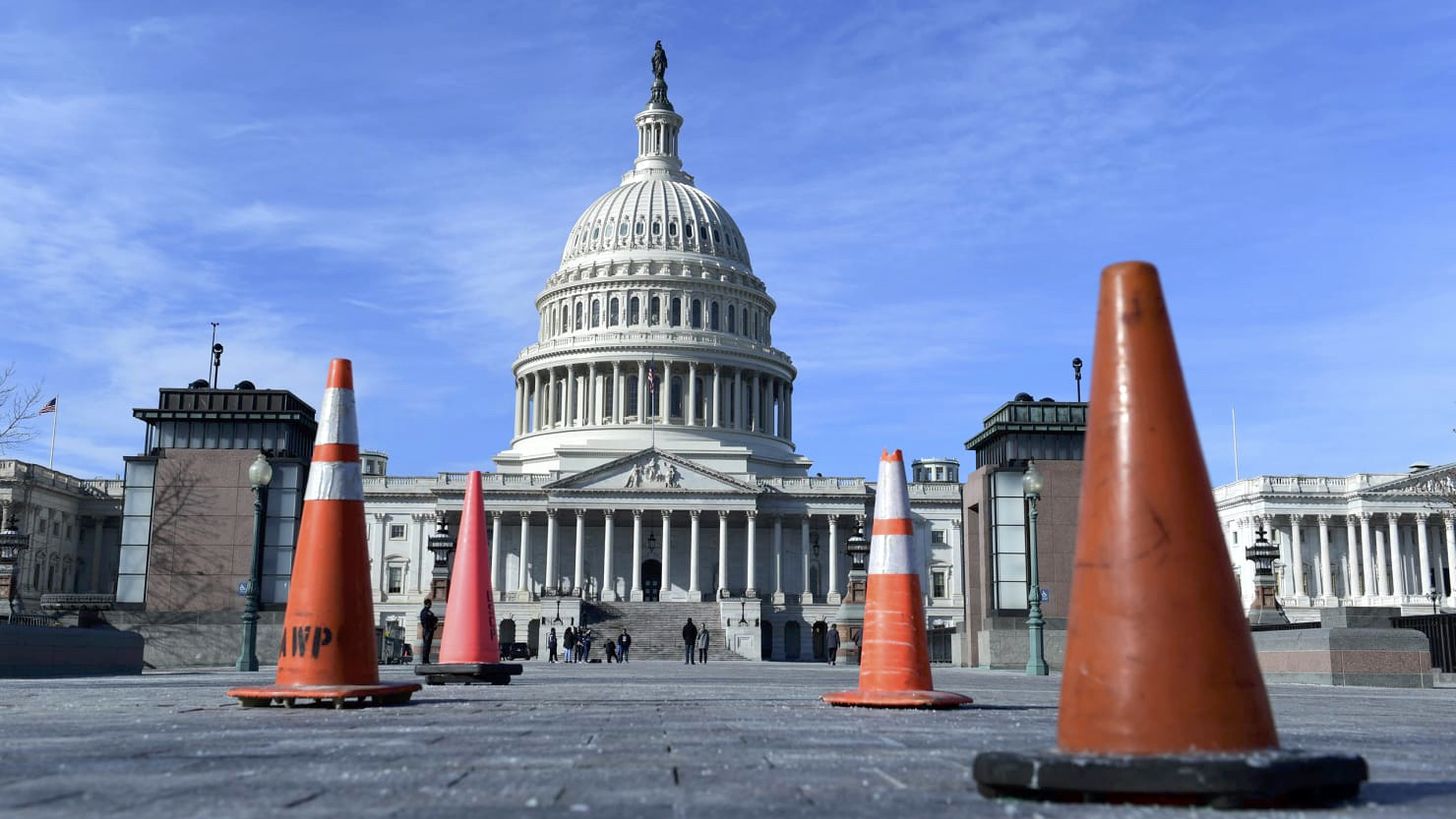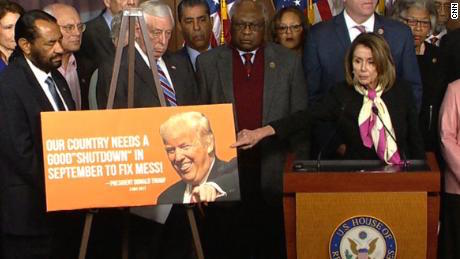
Well, well, well … The Great 2018 American Government Shutdown is over. After two and a half days of scare tactics and hype, we can all breathe easy again.
Government shutdown. Is there a two-word phrase as overrated? Here are a few that should truly frighten you:
Nuclear war. Terror attack. Aggressive cancer.
Government shutdown? Meh.
Besides, it’s a contradiction in terms. Our government never shuts down; essential services always continue. It’s more of a government slowdown—and a dishonest political ploy designed to dupe the dopes.
Can shutdowns be inconvenient? Sure. Just ask a national park tourist who shows up to reduced hours or a closed special exhibit. Annoying? You bet. So is trying to get past hordes of schoolchildren bottlenecking self-guided tour routes.
Do shutdowns produce anxiety? Of course. Anytime there’s uncertainty about the operation of the federal government, there’s nervousness. This is especially true when the uncertainty is amplified by propaganda, half-truths and fearmongering.
Truth be told, I’m more nervous about a fully operational federal government.
Do shutdowns degrade military readiness due to payroll or allowance delays? I served in the Navy during two of them and have no memory of any problems they caused. This is because neither affected me significantly.
Most military operations and personnel are unaffected by government shutdowns. Ships still patrol. Troops stay locked and loaded.
This reality makes Trump’s first-day-of-the-shutdown tweet look as silly as it is: “Democrats are holding our military hostage over their desire to have unchecked illegal immigration. Can’t let that happen!”
Who suffers?
Are furloughed without-pay government employees paid after shutdowns? According to the Congressional Research Service (CRS), the answer is YES. From their 2017 study, Shutdown of the Federal Government: Causes, Processes and Effects: “… in historical practice, federal employees furloughed under a shutdown generally have received their salaries retroactively.”
But this doesn’t mean families of furloughed employees aren’t stretched financially, especially younger ones who haven’t set aside funds to tide them over until they receive their back pay.
What about the poor? Do they suffer at the hands of whichever party is more effectively vilified for political gain? Not really. Those who get food stamps or use the Supplemental Nutrition Assistance Program (SNAP) continue to do so.
Head Start, a government hybrid version of day care and preschool for low-income families, has been affected before. The 2013 slowdown caused the temporary closing of locations serving nearly 6,300 children before re-opening with the help of private philanthropists or their state.
How about senior citizens who rely on Medicaid, Social Security and Medicare? There are delays in getting new Social Security cards, but medical benefits are not affected.
Do Veterans Administration services continue for vets? My VA called to verify my appointment while I was writing this post. And it’s for a routine blood panel and doctor visit.
The IRS, however, typically furloughs a hefty percentage of their employees. Imagine: the massive government department that taxes (and overtaxes) us doing its work with fewer people and more efficiently. How frightening.
Who benefits?
Short answer: the political party that’s successful in duping the most voters to retaliate in the mid-term elections. Of course, the real or perceived performance of a president and his party can mitigate the winners of this propaganda battle.
For example, in the mid terms following the great government shutdown of 2013, Democrats lost nine House and 13 Senate seats. This is typical and reflected a politically divided America and normal voter fatigue with the party in power.
It happened to the parties of Barack Obama, George W. Bush, Bill Clinton, and others and will almost certainly happen to our current unprecedentedly polarizing president’s party.
Shamefully, shameless self-serving schmucks like Nancy Pelosi and Chuck Shumer know and play the blame game quite well, as do their GOP counterparts. Pelosi referred to the 2013 slowdown as the “Tea Party Shutdown.” Her current creation? You guessed it: The Trump Shutdown.
She even grandstanded it as a snarky “Happy Anniversary” gift to the president based on his May 2017 tweet: “Our country needs a good “shutdown” in September to fix mess!”

Contextually, Trump’s tweet has nothing to do with his supposed lack of compassion for poor Americans or his racism or any other Machiavellian political implication Pelosi and other blame gamers try to sell us.
Speaking of Trump and his racism:
Trump as racist
Is he? Here’s an essential question:
Regarding his infamous s***hole country question, is it possible that he used the word to describe countries with failed and/or corrupt leadership, crumbling infrastructure, lack of opportunity, feeble economies, etc. rather than as a description or reflection of their people?
Is it possible that as a president who strongly favors merit-based immigration policies, he’s resistant to letting in large numbers of emigrants who’d be virtually impossible to vet in order to prioritize skilled workers over family members of those with expired visas?
Is it “un-American” to value an emigrant with skills and potential over a DACA “dreamer’s” second cousin twice removed? Former Presidents Kennedy and Johnson didn’t think so. Neither did Reagan. And yes, he signed a bill granting a one-time amnesty for people here illegally in return for tighter border control.
I don’t know the answer to the racism question because I wasn’t inside Trump’s frenetic and often childish brain when he said what he said. I don’t know whether he s***holed people OR their countries because I don’t know him or what’s in his heart or mind.
But I do know this: It’s not racist to describe a country as a s***hole when referring to how badly it’s run or to the poor quality of life it affords its citizens or to whatever makes it so crappy that its people are bailing en masse.
Newsflash: Decrying the sad state of a country can actually have nothing to do with race. The same goes for resistance to piggybacking a DACA/Dreamer deal to a spending bill, which is the cause of this silly shutdown.
Libelous labeling
Yes, labeling someone a racist because he denigrates people of other countries based on their race is a legitimate use of the word.
Labeling someone a racist because you conflate his opinion of a country with your opinion of his opinion of a country’s people is either overly emotional and faulty thinking or calculated dishonesty and character assassination.
Speaking of emotionalism, I watched many politicians and media members engage in precisely this inflammatory political behavior. For the most part, I think journalists are intelligent people. I sure hope so, because I am one.
We’re trained to ask clarifying questions, process information critically and be as fair and objective as possible with the words that come out of our mouths and minds.
What I witnessed in the coverage of Trump’s potty mouth comments about immigration is not genuine journalism. I watched posers trip over themselves to condemn, besmirch and denigrate a president they simply cannot cover objectively, let alone tolerate.
Is it any wonder many media members are complicit in our latest government shutdown blame game? I expect as much from sleazy politicians, but trained journalists should know better. And trust me, they do. They’re following the lead of leaders of one party because they loathe the leader of the other.
Apocalypse or politics?
It’s bad enough that our government is bloated, inefficient and entirely too big for its britches, but for a political party to use its operation as a bargaining chip and threaten its “shutdown” to get what they want is politically immoral and ought to be made legislatively impossible.
To be fair, this practice is partisan, petty and perpetrated by both sides. So is the blaming. House Speaker Paul Ryan pinned it on Democrats by saying, “One party in one house of this Congress is deliberately holding this government hostage.”
No one’s holding the government hostage, Speaker Ryan. It’s not tied up and gagged by ransom-demanding Dems. During a shutdown, our government is free to run on fewer cylinders and at reduced power levels.
If only we could use this “crisis” to make our government a lean, mean, liberty-preserving machine that’s more efficient and less intrusive—and more like our founders envisioned.
Tying essential issues like immigration reform to government shutdowns is a bad way to do the people’s business. It’s playing politics with taxpayer provided government services.
Shut down the shutdown
Instead of shutting down our government, let’s shut down those shut it down for political gain. Let’s fund the government first, and then tackle the hot issues. This would make for more clean and honest fights.
But for now, this should be our message to some government employees who never have to worry about working for free—President Trump and members of Congress:
Stop playing politics with a government that barely runs and does so on borrowed money. Keep the colossal, clunky machine running. Decide on a DACA grace period and extend the work permits for the “dreamers” who are working. Then talk about returning to a smart, merit-based immigration system.
To the dreamers who’ve failed to play by the rules and have not become productive and valuable citizens:
Try again when your dreams are big enough for America. But know this: It’s not your fault our politicians used you and your dreams to shut down a government. They think it’s a way to win, but when it happens, we all lose.
